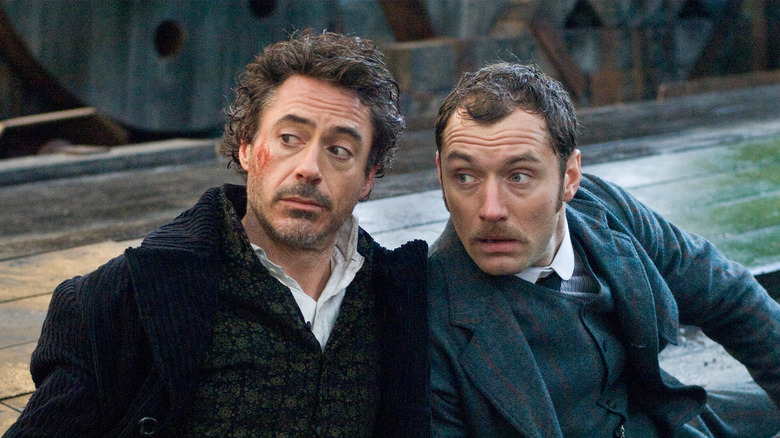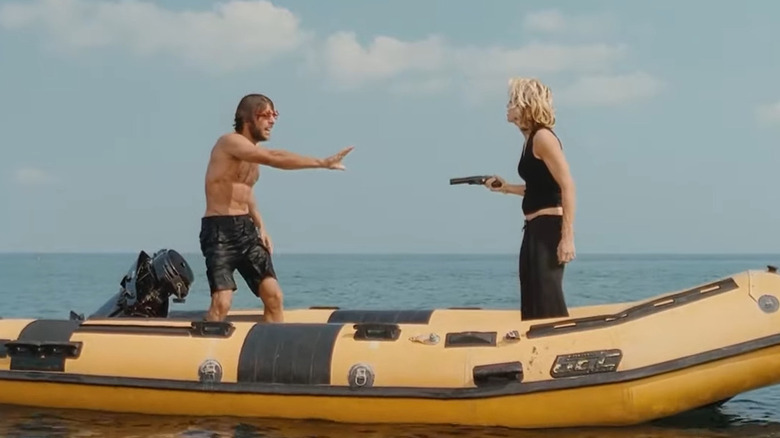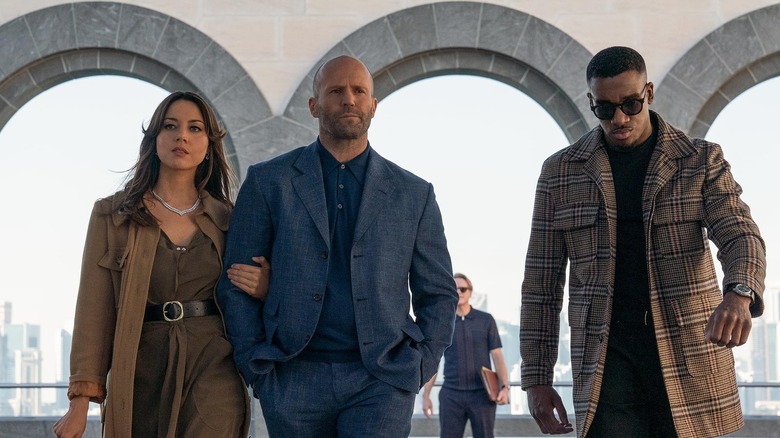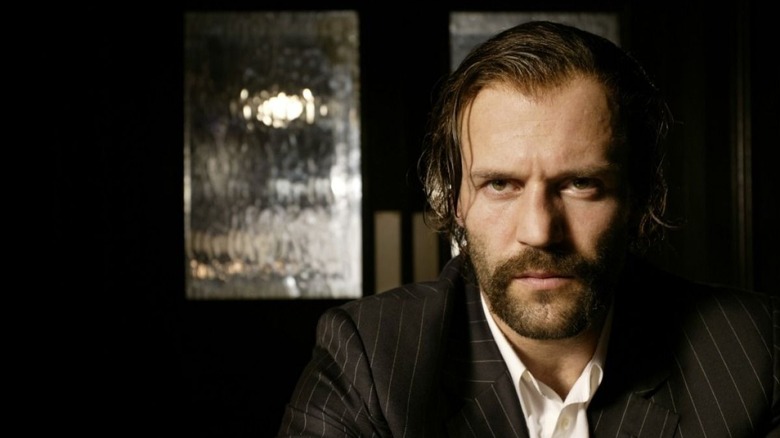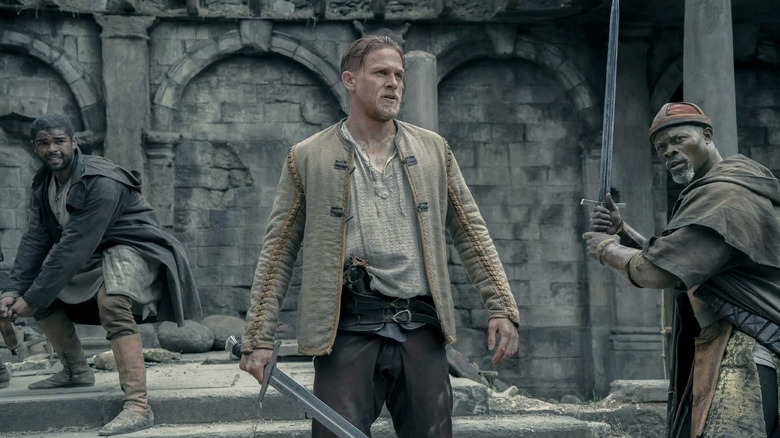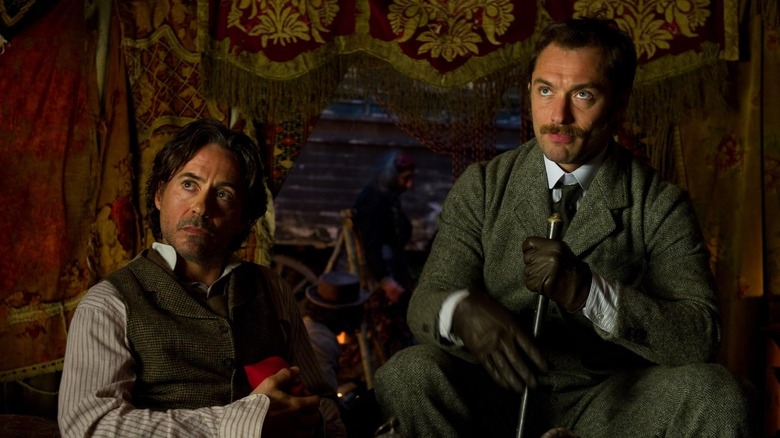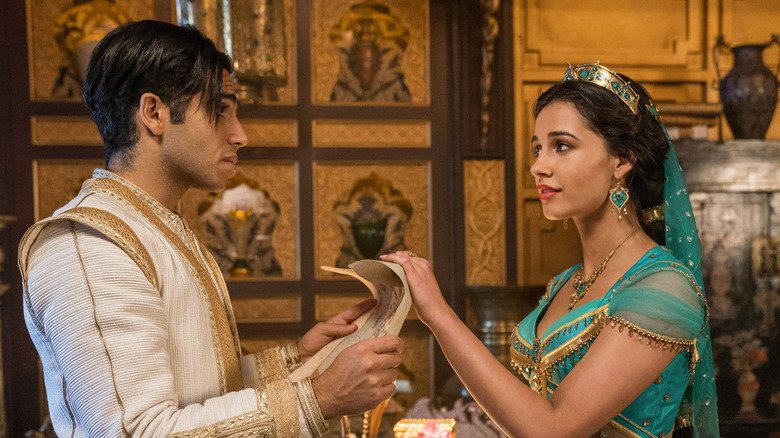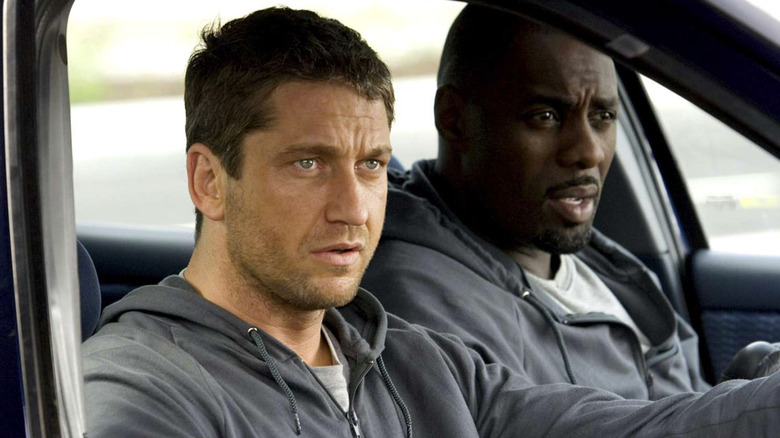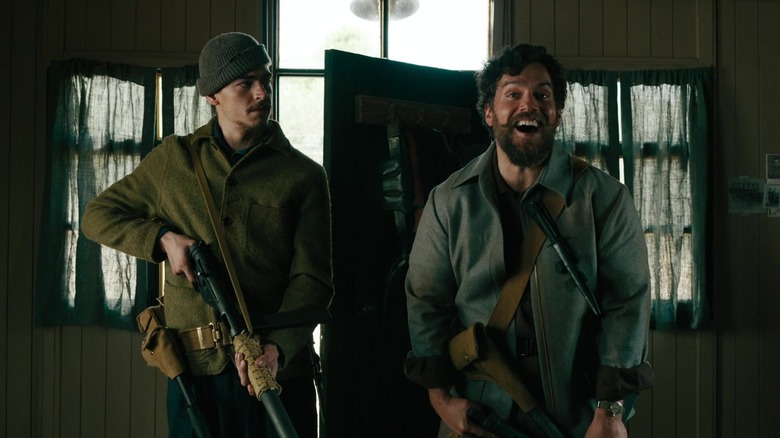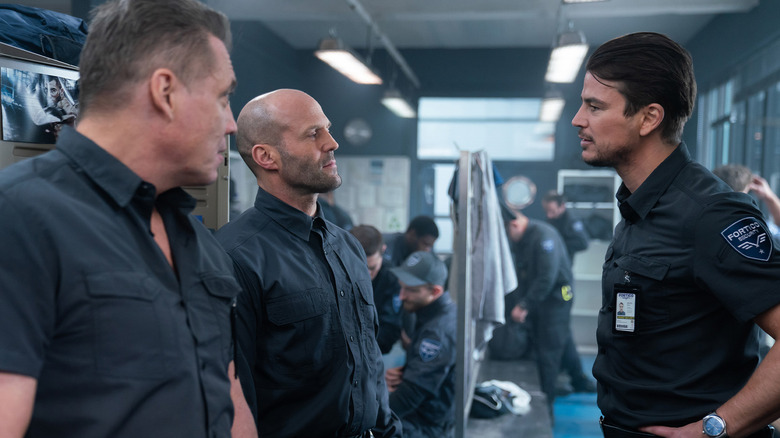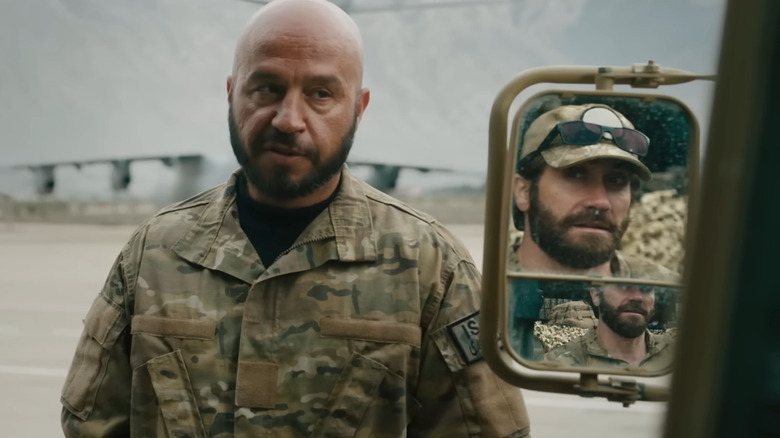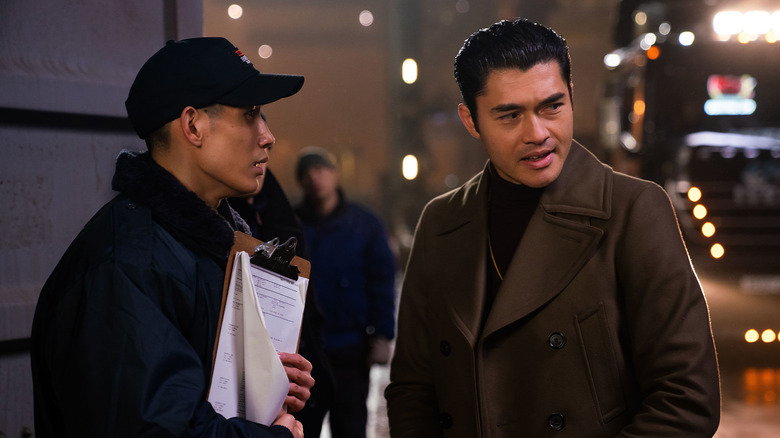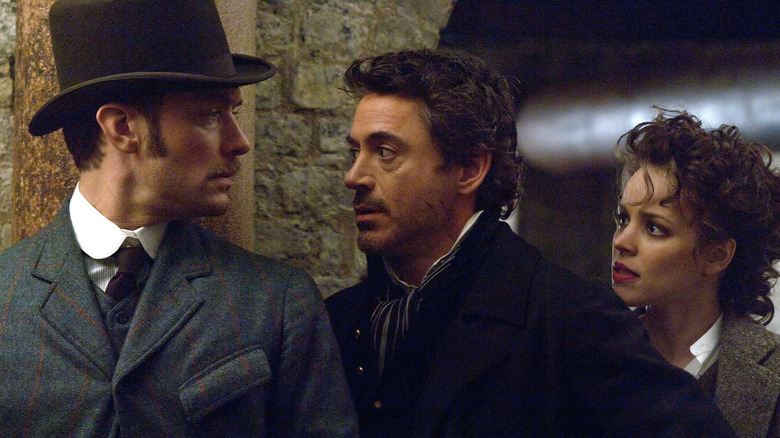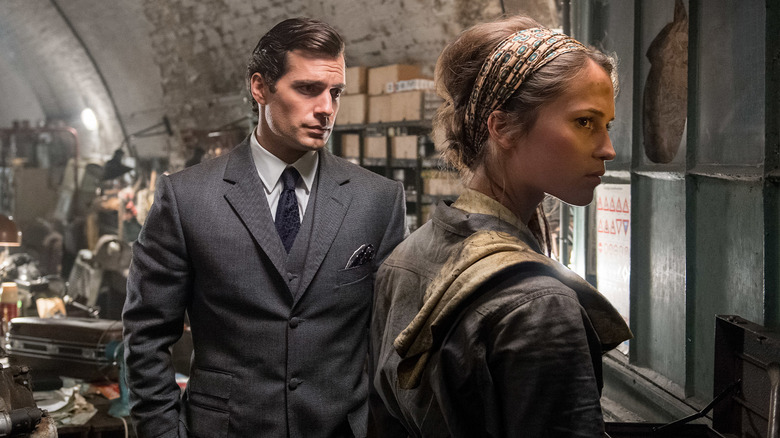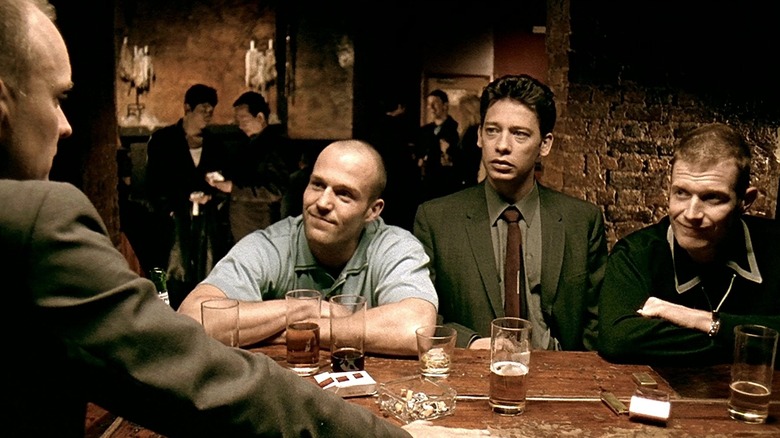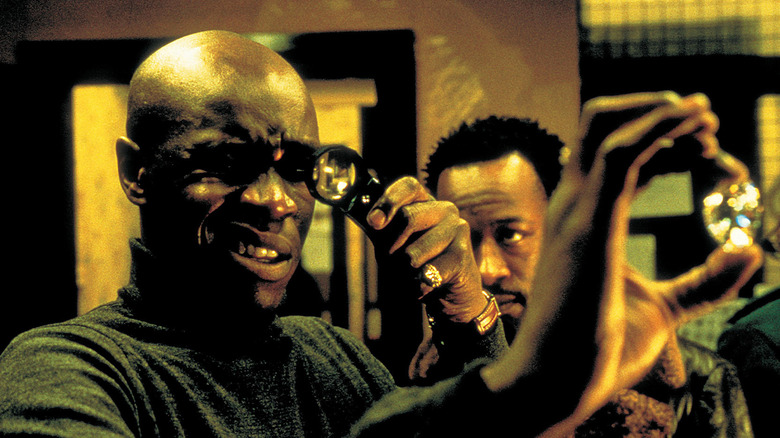Every Guy Ritchie Movie, Ranked
At best, Guy Ritchie's reputation errors on the side of eclectic. The British-born director has embraced a multitude of genres, breathing new life into crime thrillers in the early days of his career before banking a hard left to experiment with historical fiction, romance, and war. The films got bigger, and slicker, as Ritchie progressed as a filmmaker. He's worked hard to launch franchises, to build heightened worlds that run on intrigue and irreverence above all. And though not every project has worked out in Ritchie's favor, his sure-footed style has always been a heady joy to watch.
Sure, Ritchie's over-the-top style is at times easy to poke fun at. He's more or less made the same movie over and over, regardless of genre. "Sherlock Holmes" is not unlike "The Man from U.N.C.L.E," nor is "Snatch" all that far off from "RockNRolla." But there's something comforting about the way his approach slips so easily into one story after the other. It's been interesting to watch Ritchie tinker with formula over the years, and bring his bombastic sensibility to films that might otherwise be snooze fests. Say what you will about ol' Guy, but one thing he's never been is boring. He seems to make films to satisfy his own curiosity, and it's remarkable that he's been able to reinvent himself time and again.
15. Swept Away
What is there to say about "Swept Away" that hasn't already been said? The 2002 film was Ritchie's first commercial flop — and given that he was then riding high after two back-to-back successes and his high-profile union with Madonna, some could argue he was overdue for an Icarus moment. That said, the couple's remake of Lina Wertmüller's 1975 black comedy is downright painful to sit through.
Wertmüller's "Swept Away" has become an interesting Rorschach test. Its prickly political themes and glib approach to assault, abuse and hierarchies of power have stoked debate for decades. It's designed to shock, and — depending on who you ask — interrogate societal bias on every level. In that sense, Ritchie's remake is utterly unnecessary. Paired with Madonna's performance, as one half of a couple stranded on a deserted island, nothing really clicks. You're better off checking out the original — or, better yet, "Triangle of Sadness."
14. Operation Fortune: Ruse De Guerre
When it comes to Ritchie's spy flicks, the director's recent attempts haven't exactly moved the needle. "Operation Fortune: Ruse De Guerre" commits a number of movie sins (the first being that baffling title), but at the end of the day, it's not even worth the effort to comb through them. Ritchie once again feels lost in the sauce here. He's never had the best grasp on cheeky irony, and "Operation Fortune" feels like his most earnest attempt at it. It's not unlike the mid-2010s work of Matthew Vaughn — but where the "Kingsman" films weren't afraid to play up the visual gags, "Operation Fortune" just plays things a little too safe.
Statham is back as (brace yourself) Orson Fortune, a no-nonsense super spy who's tasked with recovering a high-tech MacGuffin from a suave megalomaniac (Hugh Grant). But he has to recruit a famous movie star (Josh Hartnett) to do some undercover work, a conceit that should work but ultimately falls flat. Everyone feels like they're on autopilot here, and that disinterest turns a fine-enough premise into another forgettable heist comedy.
13. Revolver
Ritchie loves to craft a byzantine crime thriller, but "Revolver" pushes the limits of the director's storytelling abilities to their absolute limit. The 2005 film is basically "Snatch" but so much worse. Three years after the abject failure of "Swept Away," Ritchie reteams with his secret weapon, Jason Statham. Their partnership should all but guarantee a home run for the director. Unfortunately, Ritchie seems utterly lost in the genre he once brought so much swagger to, and "Revolver" is made all the more unwieldy by his newfound spirituality.
Statham is a low-life gangster, recently freed from prison, on a mission of revenge against the crime boss that put him there. His master plan begins at the casino — and since he picked up a little trick in prison that makes him unbeatable, it should be a piece of cake. In theory, that is. And if "Revolver" more or less stuck to that brief, it probably wouldn't be so bad. Unfortunately the plot is as incoherent as they come, riddled with philosophical musings from the supporting cast and a handful of bewildering twists. It's not as terrible as something like "Swept Away," but it is better off forgotten ... and that might actually be worse.
12. King Arthur: Legend of the Sword
On paper, Guy Ritchie and Charlie Hunnam should be a match made in heaven, especially in a brazen retelling of Britain's most gonzo classical myth. Ritchie had already proven his affinity for historical fiction in 2009's "Sherlock Holmes" and its lesser-loved sequel, and Hunnam — fresh off subversive turns in "Crimson Peak" and "The Lost City of Z" — was ready to return to the archetype that he was built for. Producers at Warner Bros. seemed to have a lot of faith in this particular director-actor pairing, as their partnership was meant to sire a six-film franchise. Alas, "King Arthur: Legend of the Sword" didn't do quite enough to get this revisionist period piece off the ground. The 2017 film is frequently very weird and very fun, but it finds itself hampered by an outdated blockbuster formula at nearly every turn.
"King Arthur" might shine the most when Ritchie leans into his roots in crime capers. The director's frenetic, machismo style does lend a sense of novelty to Arthurian lore. Not unlike "Sherlock Holmes," "King Arthur" reimagines its title character as a brawler with a loyal crew of misfits behind him. As the would-be king that pulls Excalibur from the stone, Hunnam slips seamlessly into the brief. But that idea, however ingenious, feels pretty stale this late in the game. It doesn't help that Ritchie borrows so liberally from a handful of better epics and legends, from "Game of Thrones" to "Lord of the Rings." It's clear that Ritchie has no real reverence for the distant past, but his love for 2000s schlock isn't doing him many favors here, either.
11. Sherlock Holmes: A Game of Shadows
Flawed but undeniably fun, "Sherlock Holmes: A Game of Shadows" is a serviceable sequel to 2009's "Sherlock Holmes." Without Rachel McAdams's delightful femme fatale, Irene Adler, returning, "Game of Shadows" took a Bond girl approach to the proceedings. It's a choice that still rings hollow for fans of Ritchie's "Sherlock" duology. Noomi Rapace steps in to complete the film's unlikely trio, but her slippery fortune teller doesn't make much of an impression. Thankfully, the sequel doubles down on all the bonkers worldbuilding of its predecessor, orchestrating yet another visually-stunning chase sequence and some fun close-quarters brawls.
Robert Downey Jr. and Jude Law are in great form once again as the ever-bickering Holmes and Watson. No matter what, their odd-couple rapport is the saving grace of "Game of Shadows," but Jared Harris more than holds his own as Moriarty — Holmes' prime antagonist. "Sherlock" is probably Ritchie's best work under the studio system, and "A Game of Shadows" isn't too bad, either ... but this sequel is missing some of the magic that made its predecessor feel like such a novelty.
10. Aladdin
"Aladdin" might be the least Ritchie-esque film in the director's body of work. The film eschews his trademark bite for something much more earnest, romantic, and musically-inclined — and ironically, it kind of works in his favor. "Aladdin" is something of a delight — it's one of very few live-action Disney remakes that actually serves as a compliment to its predecessor.
That has a lot to do with its use of Will Smith. The Fresh Prince is not a comparable substitute for the late, great Robin Williams, who played the Genie to perfection in the original "Aladdin," and essentially kicked the door open for star-powered, animated vehicles. Smith's take on the Genie is frequently very funny, just in a different way, leaving room for the titular street rat (Mena Massoud) and the princess of his dreams (Naomi Scott) to become more realized characters.
That said, flaws definitely abound. A self-aware script and a few original songs do what they can to inject one of Disney's greatest stories with fresh blood, but uncanny CGI and boring characterization often render this remake flat. As far as post-Renaissance Disney pics go, "Aladdin" lands on the higher end. But the company's recent output hasn't exactly been life-changing, and Ritchie's contribution to the House of Ideas is similarly lacking ingenuity.
9. RockNRolla
By the time "RockNRolla" hit theaters in 2008, Guy Ritchie had been churning out features for about a decade. Unfortunately, the films that immediately preceded it were unprecedented flops. After "Swept Away" (which starred Ritchie's then-wife, Madonna) and "Revolver," "RockNRolla" represented an unofficial return to form. It's still a total mixed bag, with a byzantine plot that's a bit more complicated than it needs to be, and an over-reliance on its Cool Factor. But what it lacks in clarity, it makes up for with a game cast, a clever premise, and a smidge of atypical restraint.
"RockNRolla" depicts a criminal underworld that runs on the real estate market. The late Tom Wilkinson is Lenny Cole, a mob boss at the center of a fixed land deal. Russian gangsters, an icy femme fatale, a tweaked-out rock star, and Cole's own enforcers tangle themselves into knots in pursuit of a $7 million sum — and it's here, in the fraught rapport between an eclectic band of double-crossers, that "RockNRolla" really sings. Gerard Butler, Idris Elba, Thandiwe Newton, and Toby Kebbell each turn in stellar performances, while Ritchie searches for new ways to reinvent the crime caper.
8. The Ministry of Ungentlemanly Warfare
You watch enough Ritchie films, you start to recognize the same patterns repeating. That's no truer than with "Ministry of Ungentlemanly Warfare," which feels like the perfect blend of the director's most commercial films. The glossy, laissez-faire attitude of "The Man from U.N.C.L.E." lives side-by-side with the jaunty (and homoerotic) themes of "Sherlock Holmes," and it's kind of a match made in heaven.
"Ministry" belongs to the niche genre of British films bringing off-the-books World War II missions to life. In Ritchie's 2024 film, Henry Cavill and Alan Ritchson lead a team of misfits on a quest to turn the tide in the war. And they are, of course, having a bit of fun in their respective roles. Everyone is, despite the cast's very-English deadpan cool. But that coolness also translates to other aspects of the film, eliminating the friction that "Ministry" needs to make it a truly engrossing spy thriller. The stakes never truly reach the heights this story deserves, and that makes "Ministry" more forgettable than it ought to be.
7. Wrath of Man
Once upon a time, the names "Jason Statham" and "Guy Ritchie" went hand-in-hand. The former's acting career effectively began when Ritchie cast him in his feature debut, straight off a glossy modeling campaign. Statham starred in Ritchie's first two films, and they seemed to bring out the best in one another until their third team-up, "Revolver," flopped hard. The duo went their separate ways after the 2005 film, but their solo efforts rarely packed the punch that they carried together. It'd take them 16 years to reunite, but with "Wrath of Man," they proved the wait was at least a little worth it.
An English-language remake of the French thriller "Le Convoyeur," "Wrath of Man" stars Statham as H, a mystery man who finds gainful employment driving for an armored truck company. His new gig obviously comes with a veritable amount of risk — but as this is a Jason Statham picture, it's clear that any goons won't be much of a threat. It's also clear that H is a man on a mission, and the film's central twist later gives way to a blistering revenge plot. It doesn't reach the same heights as Statham and Ritchie's early collaborations, but as far as B-movies go, it definitely scratches an itch.
6. Guy Ritchie's The Covenant
Guy Ritchie has subverted his signature style time and again, but never so effectively as in "The Covenant." Yes, its full, official title is actually "Guy Ritchie's The Covenant" for some reason, but such cringey touches fade away in the face of a truly solid film. It's Ritchie's first "Band of Brothers"-esque war epic, starring Jake Gyllenhaal as U.S. Master Sergeant John Kinley. Dar Salim co-stars as Ahmed, an interpreter assigned to John's squadron in the waning years of the War in Afghanistan. Like so many Ritchie protagonists, Ahmed possesses a near superhuman ability to read people and situations. His stoic nature is also more or less defined by a recent tragedy, while his loyalty to the U.S. military is synonymous with his hatred for the Taliban.
Though "The Covenant" wasn't directly based on a true story, it builds its premise on the fact that over 300 Afghan interpreters have been killed by the Taliban, and thousands more are still missing in action. The title of Ritchie's film alludes to the U.S. government's failure to protect the native families they recruit, despite promising asylum on American soil. John only becomes more aware of this broken covenant through his relationship with Ahmed —and later takes it upon himself to honor that covenant the only way he can: by defying the limits of bureaucracy to save Ahmed and his family himself.
Admittedly, "The Covenant" is a lot of movie. It does suffer under Ritchie's quippy, ambitious screenplay (co-written with Ivan Atkinson and Marn Davies) can hold this story back at times, but it's once again saved by a compelling duo in Gyllenhaal and Salim.
5. The Gentlemen
At some point in Ritchie's decades-spanning tenure as a writer and director, he became less interested in London's criminal underworld and much more in the lives of the debauched upper crust. The players are oh-so-slightly different in films like "The Gentlemen," but the beats are essentially the same. Matthew McConaughey's Mickey Pearson is an American abroad; though he initially came from nothing, he used his street-wise skills to build a modest drug empire in England. In an echo of Ritchie's fascination with real estate, it seems he's built that empire by leasing land from English noblemen. Despite an opportunistic investigator (Hugh Grant) on his tail, and two slippery potential buyers circling his enterprise, business seems to be good.
There are many such echoes in "The Gentlemen." It's a film that cribs hard from Ritchie's own oeuvre, and as a result feels like a lot of different movies in one. All of Ritchie's trademarks are here: There's the nonlinear storytelling, the goading, borderline-offensive humor, and the web of seedy individuals prioritizing their respective agendas. There's mystery, light thrills, and a lot of swearing, all the director's greatest hits. Sadly, there's not enough of either to make "The Gentlemen" feel like a real movie, even if Ritchie seems more assured than he has in a long time.
4. Sherlock Holmes
Sherlock Holmes has always been something of a superhero. In the pages of Arthur Conan Doyle's books, there is very little he can't accomplish. Of course, he's aided by copious drug use and the occasional assist from John Watson — but Sherlock's genius was always the star of the show. For all his interest in cool, Ritchie makes sure to leave that intelligence undisturbed in "Sherlock Holmes." It just happens to live side-by-side with a bit of petulant, laddish behavior and designs on rugged action stardom.
As the title character, Robert Downey Jr. is pulling off an interesting feat. Sherlock had not felt so vibrant, so propulsive, so delightfully weird, in a very long time. Downey's Sherlock is still whip-smart (a trait we get to witness with a bit of well-timed slow motion) but he's as much a fighter as he is a thinker. Paired with Jude Law's Watson — doctor, conspirator, and long-term roommate — "Sherlock" takes on the qualities of an odd couple action comedy.
The characters in their orbit aren't nearly as interesting, though Rachel McAdams and Mark Strong do their very best. The true star of the show might just be Ritchie's sweaty, steampunk take on Victorian London. The bulk of the film's action sequences are designed to give us a tour of this reimagined city, while a sinewy score from Hans Zimmer delivers a sense of off-beat adventure. No, this is not a completely faithful adaptation, but it's good fun either way — and Ritchie deserves some kudos for that.
3. The Man from U.N.C.L.E.
Perhaps Ritchie's sleekest, glossiest, and dare I say cleanest film to date, "The Man from U.N.C.L.E." represents a turning point in his body of work. It's a reboot of the '60s TV series of the same name, and stars Henry Cavill and Armie Hammer as two sworn-enemy spies that are suddenly forced to work together. The finer details are best left ignored, as "U.N.C.L.E." still suffers a bit from an overwrought premise. All that matters is this: It's the height of the Cold War, a neofascist cell is rising in Italy, and the CIA has to partner with the KGB in order to stop them. In the middle of it all is a plucky mechanic by the name of Gaby (Alicia Vikander), who becomes the third cog in a very unlikely trio.
With "U.N.C.L.E," Ritchie gets another go at the strained bromance with an adorable female lead. That sort of love triangle felt like an afterthought in "Sherlock Holmes," but here it's a lot more settled into the story. Ritchie's hyperkinetic impulses are also impossibly restrained, making "U.N.C.L.E." a very low-key experiment in fashion, glamour, and vehicular hijinks. As spy capers go, it's a bit flatter than most. But it may also be Ritchie's first attempt at a straight adaptation, without any inclination to subvert or scandalize. Though "U.N.C.L.E." is, at best, an underrated entry in his filmography, the director is surprisingly suited to the brief. The story showed real promise; it's just a shame we never got to see it all unfold in a franchise of its own.
2. Lock, Stock and Two Smoking Barrels
Before Ritchie became the face of antsy, atemporal franchise-starters, he debuted with the raw, foul-mouthed and shockingly-funny "Lock, Stock, and Two Smoking Barrels." To many, it's the gangster flick to end all gangster flicks, as it set the tone for the genre that later dominated the early 2000s. It also rewrote the book on swaggering, British masculinity — posh stiffs like James Bond were out, while cocky brawlers like Jason Statham were suddenly in. That's not to say that "Lock, Stock" owes nothing to Ian Fleming, as it does lift its inciting incident right from the pages of "Goldfinger." The ultraviolence and irreverence of "Lock, Stock" also drew instant comparisons to the work of Quentin Tarantino, an idea that Ritchie spent years trying to brush off.
The comparisons aren't entirely without merit, but both Ritchie and Tarantino draw from a pool of influences — the crime capers of the '60s and '70s, most notably — so comparing the two will only take you so far. More than that, there's a sort of empty-headed quality to Ritchie's films that isn't really a factor in Tarantino's. I mean this in the most affectionate way possible, of course — there's nothing wrong with a bit of empty entertainment. The success of "Lock, Stock" only speaks to that. Though its chopped-and-screwed storyline betrays a very simple premise, its brazen confidence was more than enough to carry Ritchie into the big leagues.
1. Snatch
You may not be able to understand a damn thing Brad Pitt is saying in "Snatch," but that's also a small part of this film's appeal. By the time Guy Ritchie returned with his second feature film, the crime genre was operating at peak efficiency. Tropes and archetypes were doing most of the heavy lifting story-wise, allowing audiences to enjoy nail-biting heists and gleefully-violent capers without having to think too hard.
"Snatch" is no different. It zigs and zags like any Ritchie film, but at the end of the day, it's just about a bunch of guys trying to steal an 84-karat diamond. Elsewhere, Pitt plays a bare-knuckle boxer (because would this be a Guy Ritchie movie without bare-knuckle boxing?) at the center of a fixed game. Jason Statham is a boxing promoter and also narrates throughout, establishing the important players and explaining how these two seemingly-disparate stories eventually intersect.
Ritchie's signature style has never been more potent than it is here. "Snatch" cannot claim to be perfect, especially given its similarities to "Lock, Stock." It's cribbing hard from Ritchie's first movie — but in a way, that makes "Snatch" something of a soft reboot. Ritchie seems more confident in his visual flourishes and narrative quirks, doubling down on the overbearing narration, nonlinear timeline, and cast of hard-boiled characters with funky names ("Franky Four Fingers," "Doug the Head," et al). No, not all of it makes sense, but very few of Ritchie's films really do. Does that stop "Snatch" from being a rollicking good time? No ... no, it does not.
